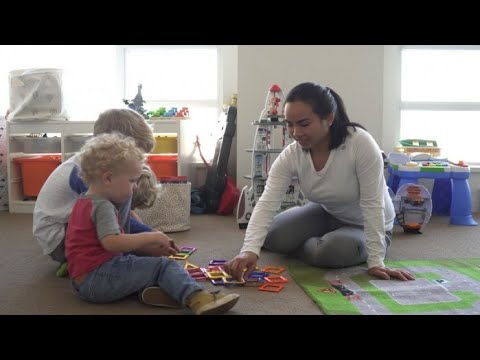Career Overview
Home child care providers look after the well-being, and physical and social development of children. In B.C., these workers are known as licence-not-required (LNR) child care providers. They may work with children on an ongoing or a short-term basis. Nannies are included in this group.
Foster caregivers, often called foster parents, are also included, although their role differs in some ways.
Job Titles
Duties
In general, home child care providers:
- Supervise children
- Make infant formula and change diapers
- Bathe and dress children
- Plan, prepare and serve children’s meals
- Maintain a safe and healthy home environment
- Teach children good personal hygiene
- Tend to children’s emotional needs and social development
- Discipline children according to parents’ wishes
- Organize and take part in activities such as games, crafts, reading and outings
- Take children to and from school and appointments
Some home child care providers also do housekeeping tasks. Some keep records of the children’s daily activities and health information.
In general, foster caregivers:
- Act as a foster child’s primary caregiver for an agreed-upon period
- Work under the direction of the B.C. Ministry of Children and Family Development (the Ministry)
- Work with the Ministry and the child’s care team to set up a care plan
- Ensure their home meets government standards
- Arrange and attend family visits with the child
- Take part in events and activities that keep the child connected to their family and culture
- Keep daily journals tracking the child’s experiences, development, challenges and successes
- Submit monthly logs for review
- File details of reportable events
- Keep in contact with resource workers and the child’s guardianship or social worker
Earnings
Earnings is income that workers receive in exchange for their labour. Depending on the type of employment, earnings can be in the form of wages (hourly), salaries (fixed monthly or annual) or self-employed earnings.
Work Environment
# Workers Employed
7,280% Employed Full Time
36%Home child care providers may work for child-care agencies or be self-employed. They may care for a maximum of two children at a time (in addition to their own), or more if the children are siblings.
Some home child care providers work in their own homes. Others work in the children’s homes, where they may also live. They usually work indoors but may also spend time outdoors.
Work hours vary and may include evenings, nights, weekends and holidays.
Foster caregivers are contracted and regulated by the B.C. government. They work in their own homes. They may care for up to six children, or for two if the children have special needs.
Foster caregivers must always be available, including evenings and weekends. Those who care for children with physical, psychological or behavioural problems must go to appointments with the children. These can include hospital stays or regular therapy sessions.
Foster caregivers often find the work to be both stressful and rewarding.
Career Pathways
Workers in this group often move from one area of home child care to another. They may advance by becoming licensed and opening their own licensed home child care facility.
Foster caregivers can specialize in particular levels of care or on specific health or learning disabilities.
Occupational Interests
It’s important to understand what kinds of occupations align with your interests.
For more about occupational interests visit Skills for the Future Workforce > Characteristics.
Here are the top occupational interest(s) for this career profile:
Education, Training and Skills
Home child care providers may need to have:
- Completed secondary school
- Completed a training program in child care or a related field
- Experience in child care or household management
- First aid certification and CPR training
In B.C., home child care providers are not regulated. However, they are encouraged to register with the Child Care Resource and Referral (CCRR) office closest to them.
Foster caregivers must complete:
- A comprehensive application process
- Home study
- A home check, criminal record check and medical checkup
- An online pre-service program
- An online in-service learning series
- Ongoing workshops to further their education
Education programs in B.C.

Top Skills
Every job calls for a certain set of skills. Knowing those skills is the first step in finding a good career fit.
Here, you will find the 10 most relevant workplace skills. Some are more important to achieving success in a certain career than others. These skills may come naturally to you or you may need to gain them through education, training and experience.
See the list of work-related skills below, ranked in order of importance for this career. Check out the list and see if this career matches your skills—take that first step!
Keeping track of and assessing your performance, other individuals, or organizations to make improvements or take corrective action.
Being aware of others’ reactions and understanding why they react as they do.
Actively looking for ways to help people.
Giving full attention to what other people are saying, taking time to understand the points being made, asking questions as appropriate, and not interrupting at inappropriate times.
Talking to others to share information effectively.
Using logic and reasoning to identify the strengths and weaknesses of alternative solutions, conclusions or approaches to problems.
Adjusting actions in relation to others' actions.
Considering the relative costs and benefits of potential actions to choose the most appropriate one.
Convincing others to change their mind or behaviour.
Being able to solve novel, ill-defined problems in complex, real-world settings.
Labour Market Statistics
Discover data, facts and information that have been gathered and analyzed. Learn about the characteristics of the economy and labour market in B.C.
Employment
Find out about employment types and trends by region and industry.
Employment
7,280Employment by Region







| Region | Employment | % Employment of this Occupation |
|---|---|---|
| Cariboo | 185 | 2.5% |
| Kootenay | 185 | 2.5% |
| Mainland/Southwest | 4,970 | 68.3% |
| North Coast and Nechako | 100 | 1.4% |
| Northeast | 85 | 1.2% |
| Thompson-Okanagan | 640 | 8.8% |
| Vancouver Island/Coast | 1,115 | 15.3% |
Labour Market Outlook
The B.C. Labour Market Outlook is a 10-year forecast of the expected supply and demand for labour in the province. It’s usually updated every year. The purpose is to provide British Columbians with the knowledge to make informed decisions on careers, skills training, education and hiring.
Forecasted Job Openings (2025-2035)
260Forecasted Job Openings
Forecasted Employment Growth Rate
Composition of Job Openings
Job Openings by Region (2025-2035)







| Region | Job Openings | Avg. Annual Employment Growth |
|---|---|---|
| Cariboo | 0 | -3.6% |
| Kootenay | 0 | -3.5% |
| Mainland/Southwest | 60 | -1.8% |
| North Coast and Nechako | 0 | -2.8% |
| Northeast | 0 | -2.1% |
| Thompson-Okanagan | 0 | -2.6% |
| Vancouver Island/Coast | 320 | 0.7% |
Industry Highlights
Learn about the opportunities in B.C.'s major industries, including employment trends, earning potential, locations of work and more.
Forecasted Job Openings by Industry
| Industry | Job Openings (2025-2035) |
|---|---|
| Repair, Personal and Non-Profit Services | 230 |
| Health Care and Social Assistance | 40 |
Insights from Industry
As higher numbers of parents work from home offices, more providers are doing child care in their own homes, rather than in their employer’s.
Foster caregivers get a monthly payment to cover the direct costs of caring for a child. Those caring for children with health or learning disabilities receive additional payment. Although many foster parents don’t work outside of the home, foster caregiving is not employment and does not take the place of a regular job. Families choose to foster because of a concern for children and a desire to contribute to the community.
There is high demand for foster caregivers, especially those with special skills or experience, such as psychiatric or medical training.
Resources
-
B.C. Ministry of Children and Family Development (MCFD)www.gov.bc.ca/mcfd
-
BC Council for Familieswww.bccf.ca
-
BC Family Child Care Association (BCFCCA)www.bcfcca.ca
-
BC Federation of Foster Parent Associations (BCFFPA)bcfosterparents.ca
-
Child Care Resource and Referral (CCRR) Centreswww2.gov.bc.ca/gov/content/family-social-supports/caring-for-young-children/childcarebc-programs/child-care-resource-referral








